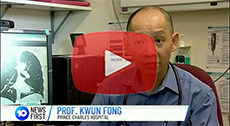TPCH researchers turning the tide on lung cancer
A team of researchers at The Prince Charles Hospital (TPCH) are turning the tide on the world’s deadliest cancer, after bringing an international CT screening trial to Australia to detect lung abnormalities, before it’s too late.
Just 15 per cent of patients diagnosed with lung cancer will survive five years past their diagnosis – something Lung Specialist Professor Kwun Fong and his research team at The Prince Charles Hospital (TPCH) are determined to change.
“More than one million people worldwide die from lung cancer each year. In Australia, as many as 13,000 new cases will be diagnosed and as many as 9000 patients will die this year alone,” Professor Kwun said.
“While lung cancer accounts for almost 10 per cent of all cancer diagnoses, it accounts for almost 19 per cent of deaths because it is typically diagnosed at an advanced state, which greatly reduces the efficacy of even the most cutting-edge treatments,” he said.
As Queensland’s leading heart and lung centre, TPCH has partnered with The University of Queensland Thoracic Research Centre to lead the Australian leg of the trial, which is following more than 4000 smokers and ex-smokers aged 55 and over from across the world.
“This trial aims to identify ways we can detect lung cancer in its early stages using state-of-the-art, low-dose CT scanners, incorporating the most advanced detection technology available – Computer Aided Diagnosis (CAD),” he said.
“Being able to identify at risk people most likely to benefit from this scanning allows us to minimise unnecessary tests and radiation from a CT scan, thereby reducing the potential harm to the patient,” he said.
Approximately 1000 people have joined the Australian trial, funded by the National Health and Medical Research Council, since it began last year at hospitals in Brisbane, Sydney, Melbourne and Perth, however more Queenslanders are needed.
“For the first time, this research will test a new way to predict who will benefit from CT screening. This will help worldwide in improving success rates and significantly improve the screening process for those who are at highest risk, and thus, most likely to benefit.
“The trial means that if proven, we can use simple risk reduction calculators to identify who is most likely to gain from low dose CT scans, and save more lives.”
To be considered, individuals must be a current or former smoker, age between 55 and 80, and be in good general health.
People wanting to join the trial can contact the International Lung Screen Trial (ILST).

